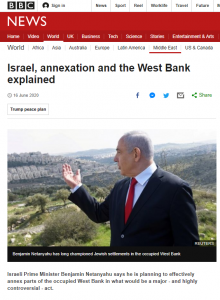On June 16th the BBC News website published a backgrounder titled “Israel, annexation and the West Bank explained” on its ‘Middle East’ page.
“Israeli Prime Minister Benjamin Netanyahu says he is planning to effectively annex parts of the occupied West Bank in what would be a major – and highly controversial – act.”
The first section after that introductory sentence is headed “What is the West Bank?”.
“It is a chunk of land located – as the name suggests – on the west bank of the River Jordan and bounded by Israel to the north, west and south. To its east lies Jordan.”
Seeing as the area to which that term refers varies in width between 30 and 55 kilometers, it is clearly includes far more than just the bank of a fairly small river. BBC audiences are however given no information concerning the relatively recent origin of the term ‘West Bank’.
In 1947 the UN referred to “the hill country of Samaria and Judea” in the proposed Partition Plan which was rejected by the Arab states. The term ‘West Bank’ of course did not exist at that time because the country that invented it – referred to in the same document as “Transjordan” – had not yet invaded, occupied and subsequently illegally annexed that territory.
Although the term ‘West Bank’ (along with the name change from Transjordan to Jordan) was conceived by an invading country seeking to legitimise its occupation of land to which it had no legal claim (the territory had in fact been assigned to the creation of a Jewish national home by the League of Nations over two decades earlier) the BBC exclusively employs that partisan term both in this backgrounder and in its content in general.
Despite the origin and intention of the term ‘West Bank’, the obviously relevant question of the appropriateness of its use (given the BBC’s supposed editorial obligation to impartiality) does not even arise in the corporation’s ‘style guide’.
Having exclusively promoted the terminology which erases a part of the area’s history which is highly relevant to this backgrounder’s supposed subject matter, the anonymous BBC writer proceeds, using the corporation’s usual practice of commencing history in June 1967.
“The West Bank has been occupied by Israel since the 1967 Middle East war, but decades of difficult on-off talks between Israel and the Palestinians – both of whom assert rights there – have left its final status unresolved.”
No mention is made of the specific offers refused by the Palestinians over the years or terror war known as the second Intifada initiated by Yasser Arafat.
Readers then find a much recycled partisan map sourced from the political NGO B’tselem which, among other things, portrays the Jewish Quarter of the Old City of Jerusalem as a ‘settlement’.
The backgrounder goes on:
“Between 2.1 million and 3 million (sources vary) Palestinian Arabs live in the West Bank under both limited self-rule and Israeli military rule.”
By “limited self-rule” the BBC apparently means Area A, where the Palestinian Authority has full control and where the vast majority of Palestinians live. By “Israeli military rule” the BBC apparently means both Area B, where the PA has civil control and Israel has control over security, and Area C which is under Israeli control. The BBC omits any mention of the fact that that arrangement was agreed to by the Palestinians as part of the terms of the Oslo Accords.
Readers then find the BBC’s standard partial insert concerning ‘international law’.
“The West Bank (excluding East Jerusalem) is also home to some 430,000 Israeli Jews who live in 132 settlements (and 124 smaller “outposts”) built under Israel’s occupation.
The vast majority of the international community considers the settlements illegal under international law, though Israel and the US under the Trump administration dispute this interpretation.”
BBC audiences are not provided with any information which would enhance their understanding of why that “interpretation” is disputed by some parties.
In addition to failing to meet the BBC’s supposed standard of impartiality on ‘controversial subjects’ by neglecting to provide “an appropriately wide range of significant views”, that omission also impedes audience understanding of the next part of the backgrounder, as will be discussed in part two of this post.






Given that the Brits were responsible for Transjordan and the Arab League invasion of Israel in 1948 in the first place, it is no wonder they keep using TransJordanian nomenclature, as any Arab/Islamist Supremacists with a severe case of acculturated Jew Hate would. And this is a surprise, how?